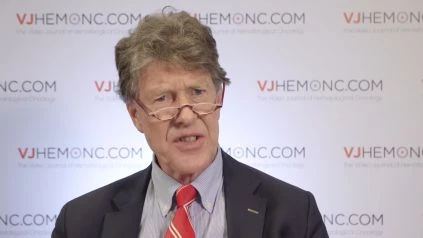Anton Hagenbeek, MD, PhD from University of Amsterdam, Netherlands provides a summary of the press briefings held at the European Hematology Association (EHA) 2016 Annual Congress in Copenhagen, Denmark. First, Prof. Hagenbeek discusses a follow-up trial on immune checkpoint inhibitor nivolumab in Hodgkin lymphoma called Checkmate 205 (NCT02181738) presented by Prof. Anas Younes. Nivolumab works by reactivating T-cells in the lymph nodes, attacking the malignant cells and kills them through giving an antibody that prevents contact between the Reed-Sternberg cells and the lymphocyte which paralyzes the lymphocyte. Releasing the break would then allow for the T-cell to kill the Hodgkin cells. Patients had been heavily treated for Hodgkin lymphoma, relapsing multiple times. They had received an autologous transplant with prior high dose chemotherapy treatments, and then also brentuximab vedotin. When treated with nivolumab, results show an overall response rate of 70%, with 10% complete remission (CR). Prof. Hagenbeek proceeds to suggest that nivolumab should be used earlier on in the disease and combined with another drug such as brentuximab vedotin. The ultimate goal is to keep the cure rate as high as possible and reduce the early and late side effects. Dr Amir Fathi presented on SGN-CD33A in combination with hypomethylating agents (NCT01902329) for older patients with acute myeloid leukemia (AML). SGN-CD33A is an antibody directed against CD33 and upon binding, it is internalized into the cancer cells which ultimately causes the cells to be killed. A significant response rate in elderly patients was shown in combination with hypomethylating agents. Prof. Hagenbeek thus believes that introducing this combination in younger patients and at an earlier stage, could promise higher remission and cure rates. Dr Mette Hazenberg presented on the finding that killer antibodies produced by B-cells can be detected in AML patients that have received an allogeneic stem cell transplantation. This will now be explored and used to fight AML. Finally, Prof. Hagenbeek discusses the presentation by Dr Katherine High on hemophilia. Dr High presented her findings on a treatment where four patients were treated with a new adeno-associated virus (AAV) vector. The results showed a sustained increased level of factor IX in the blood of these patients, with levels of above 30-40% over a sustained period of time. Prof. Hagenbeek highlights that the four patients no longer needed the coagulation preparation on a weekly basis, and emphasizes that this data is very promising. Recorded at the European Hematology Association (EHA) 2016 Annual Congress in Copenhagen, Denmark.
Highlights from EHA 2016 press briefings: Nivolumab, SGN-CD33A and hemophilia

